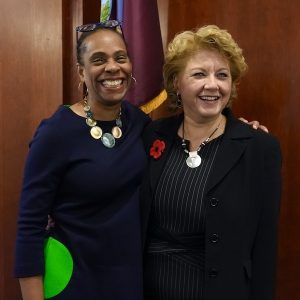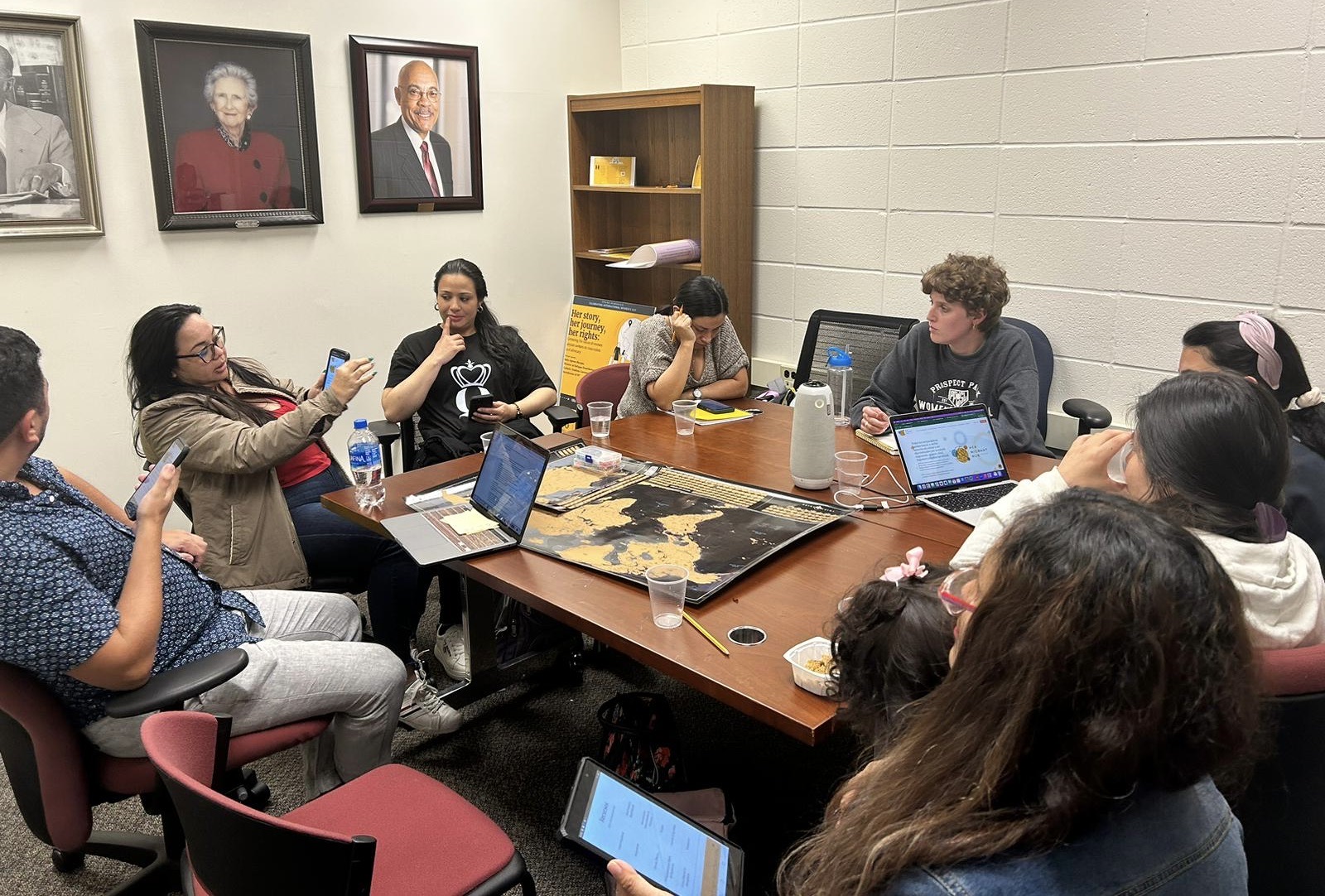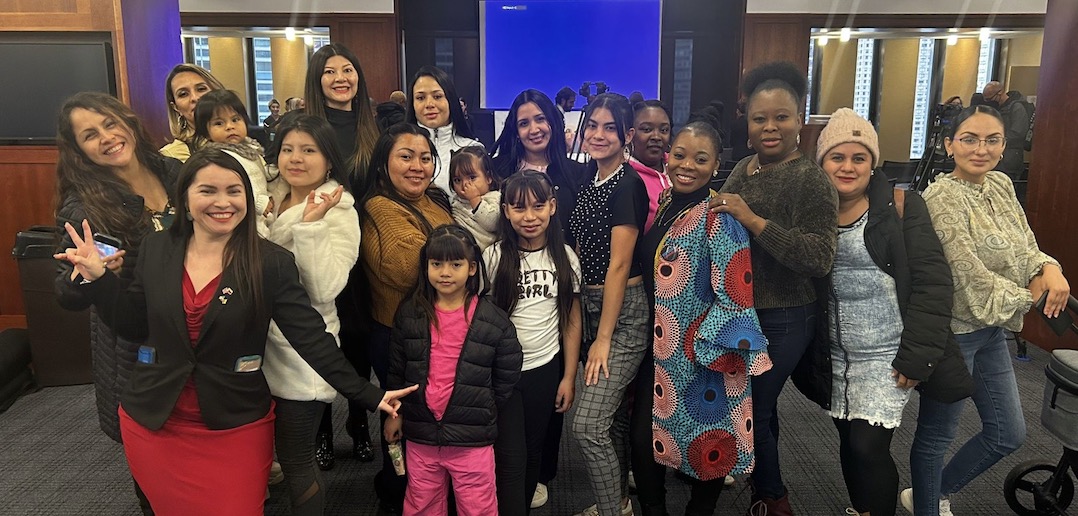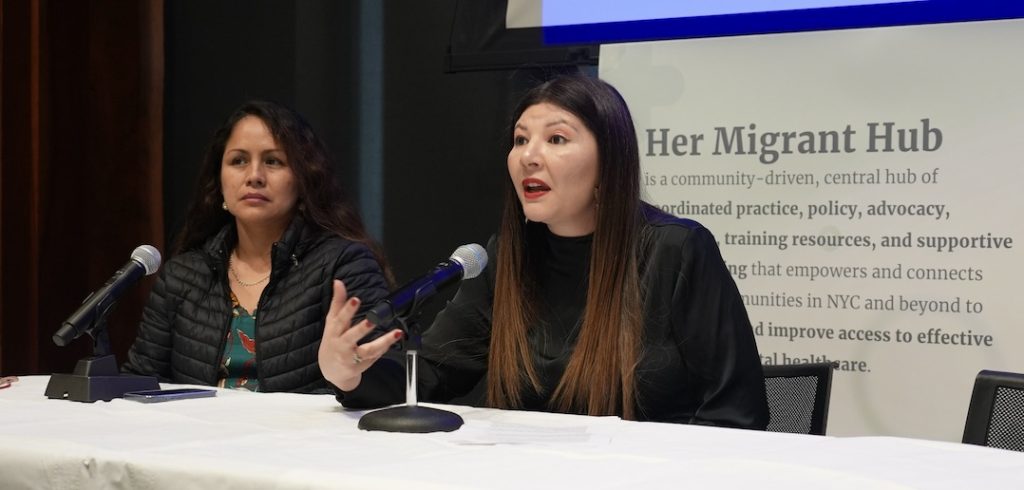Students and faculty in Fordham’s Graduate School of Social Service are supporting women asylum seekers, one of the most vulnerable populations in New York City, by working with them to increase access to health care and mental health services and advocate for the protection of migrants’ rights.
On Nov. 10, they convened with activists who work in academia, city government, the law—and women asylum seekers themselves—to talk about future work and solutions.
‘The Solutions Will Come From People’s Voices’
Over the past year and a half, more than 130,600 migrants arrived in New York City from countries like Venezuela and Senegal, seeking asylum from violence, persecution, and other traumas in their homelands. The city provides temporary shelter and helps migrants to apply for legal status, work authorization, and permanent housing, but it’s not easy to address every single need. In fact, the city just announced that it is limiting shelter stays for migrant families with children to 60 days in its housing system.
“The city is doing the best that they can. But the solutions to what’s happening right now are not going to be coming from the city,” said Anne Williams-Isom, FCLC ’86, New York City deputy mayor for health and human services, at the symposium, which was held at Fordham’s Lincoln Center campus. “The solutions will come from people’s voices who have experienced this and who are sharing their stories with us, and hoping that academia and government and others will listen.”
Her Migrant Hub

Those in academia are listening. Through Her Migrant Hub, a website created by Fordham faculty, students, and women asylum seekers, migrants in New York City are able to better understand their rights in the U.S. and easily access services with a direct impact on women’s well-being, such as health care, housing, and mental health. Perhaps most uniquely, they are taught how to tell their own stories and to advocate for themselves and their loved ones.
Her Migrant Hub has greatly expanded since its inception in 2021. The community-driven program, which primarily receives funding from the Mother Cabrini Health Foundation and is supported by additional funding from organizations like World Education Services Mariam Assefa Fund, is revamping its web platform based on suggestions from women migrants, students, scholars, and service providers. The website was updated this November with several new additions, including direct mental health support via phone, text, or video on the platform itself.
In addition, Her Migrant Hub now has an advisory board that includes eight women asylum seekers who have become activists. Six of them are from the initial core Her Migrant Hub group; one is a representative for newly arrived women asylum seekers, and another is a representative of the community of indigenous Garifuna women asylum seekers. The board also includes two service providers who are able to listen to the women and develop solutions based on their feedback. They now meet in a dedicated space at the Lincoln Center campus that the activists and GSS students will decorate to reflect the different cultures and shared stories of the community.
The Her Migrant Hub team, led by GSS professors Marciana Popescu, Ph.D., and Dana Alonzo, Ph.D., is also planning a series of trainings on trauma-informed care, migration-related trauma, and vicarious trauma for service providers who work with this population in New York City. Women asylum seekers will also receive training on how to educate migrant communities, employers, and service providers about forced migration and the challenges faced by their community.

Students Engaging with Migrants in Crisis
GSS students are engaged in all of these efforts. Two sit on the advisory board alongside the asylum seekers. Eight are interning at organizations such as the New York City Mayor’s Office’s new Asylum Application Support Center and Emma’s Torch. Others are participating in Forced Migration and Social Work Policy and Practice, a new course co-developed by GSS professors and Her Migrant Hub’s women activists. This course is part of a project funded by New York Community Trust, which aims to develop best practices for social workers who work with migrant populations and engage students in specialized internships.
Most recently, in October, clinical social work students under the supervision of Alonzo began providing one-on-one mental health support to migrants through the Her Migrant Hub website.
Among the students involved in this collective work is Luisa Fernanda Sandoval Cortes, a Ph.D. student who serves as a case manager coordinator for a program for asylum seekers at Catholic Charities of New York. For Her Migrant Hub, she is a project coordinator, facilitating a mental health group for new women asylum seekers. She shared some key takeaways from her experiences at the Nov. 10 symposium.
“Social workers and professionals should be trained in assisting asylum seekers from an intersectionality perspective to be able to understand gender, race, language, and cultural differences among this population,” said Cortes, who also emphasized the importance of providing fast and extended work permits to migrants. “And I would add empathy.”

Read more about the symposium.


